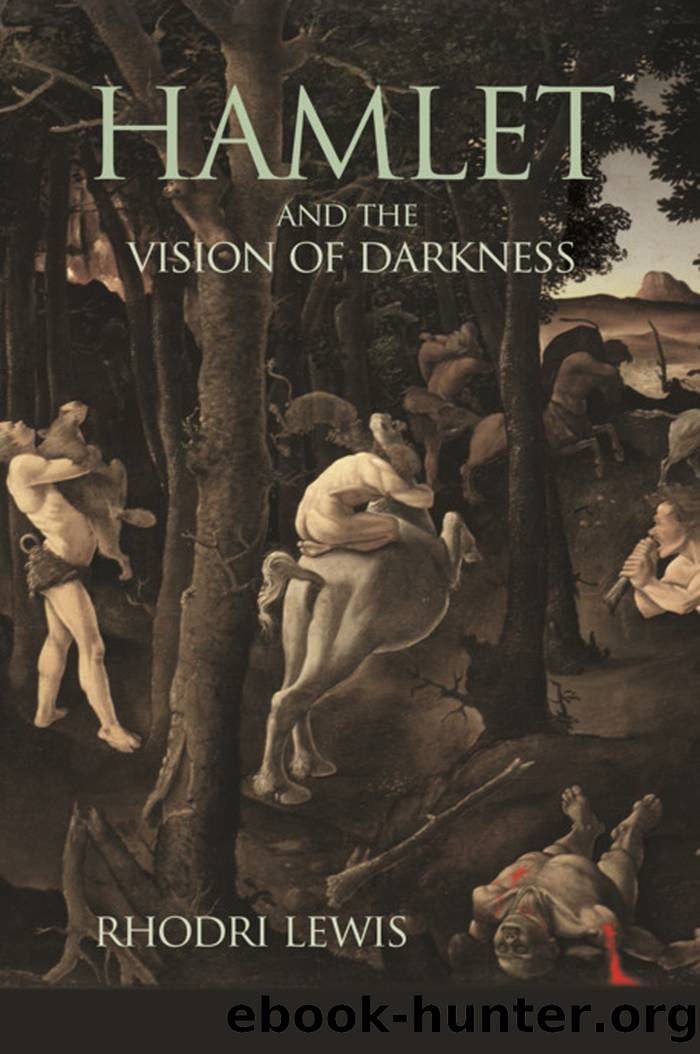Hamlet and the Vision of Darkness by Lewis Rhodri;

Author:Lewis, Rhodri; [Lewis, Rhodri;]
Language: eng
Format: epub
ISBN: 9780691204512
Publisher: PrincetonUP
Published: 2020-07-15T00:00:00+00:00
How to make sense of this in connection with Hamlet? Letâs take it as read that Poloniusâs solicitousness about the playerâs well-being is another of his politic indirections: as he must be aware, a good actor positively should have tears in his eyes while delivering such a speech. The player is a master of his craft. In his effort to move both the fictional Dido and the members of his real-world audience, welling up is to be expected.40 What Sidneyâs account of Aeneas helps us to appreciate is that neither pedantry nor the fear of Hamletâs vengeful thoughts motivate Poloniusâs decision to cut short the playerâs performance. Rather, he begins to suspect that Aeneasâs continued narration will trigger in Hamlet thoughts of pietas and patrilineality. Ordinarily, this would not be a problem. Yet at this point in the history of Claudian Elsinore, Polonius worries that if the already troubled nephew of the king (heir presumptive and son of the previous king) were to start down this line, trouble would like as not follow. Better to tidy Aeneas away before the young man becomes further distracted. Concern for the actorâs tears is his conveniently tactful pretext.
Polonius might have saved both his anxiety and his art. The difficult virtues of pietas as embodied by Aeneas are no more on Hamletâs mind than revenge as emblematized in the figure of Pyrrhus. He fixates instead on the practical business of acting, and on the actorâs ability to counterfeit the display of emotionâthe more elaborate, the better. David Scott Kastan puts it well: âOddly, Hamlet wishes to imitate the player rather than Pyrrhusâ.41 Rather than focus on the nature of his âcauseâ (or how it might resemble those of Aeneas, Pyrrhus, and Hecuba), Hamletâs attention is given over to the mechanics of the playerâs performance, along with its theoretically âmonstrousâ affects. In other words, the speech leaves him neither appalled, confounded, maddened, nor in any way amazed. He is simply agog at the skill with which the actor is able to inhabit his role so compellingly, whereas he âcan say nothingâ (2.2.563)âcannot even say anythingâdespite professing to have so many weightily provocative things within him. The further irony is that the language in which Hamlet voices these thoughts closely resembles that of Senecaâs Atreus stirring himself to prosecute vengeance against his brother with renewed determination.42 Hamlet again tries on a vindictive persona without being able make it his own.
One hundred and sixty lines before we hear Hamlet react to the passionate speech he has demanded, he reveals his immersion in theatrical history by referring to the most famous of ancient actors: âMy lord, I have news to tell you. When Roscius was an actor in Rome â¦â (2.2.386â87). Roscius was Ciceroâs contemporary and was often held up by him as an example of what the would-be orator should imitate in his manner of delivery. In due course, he became a byword for histrionic accomplishment and, on some accounts, was also responsible for devising the personae worn by Roman actors to make their characters known on stage.
Download
This site does not store any files on its server. We only index and link to content provided by other sites. Please contact the content providers to delete copyright contents if any and email us, we'll remove relevant links or contents immediately.
The Death of the Heart by Elizabeth Bowen(3390)
East of Eden by John Steinbeck(3092)
Flowers For Algernon by Daniel Keyes(2781)
To Kill A Mockingbird by Harper Lee(2614)
Lord of the Rings by J.R.R. Tolkien(2475)
A Clockwork Orange by Anthony Burgess(2342)
I Capture the Castle by Dodie Smith(1921)
Scoop by Evelyn Waugh(1908)
Herbert, Frank - Dune 01 - Dune by Herbert Frank(1810)
LORD OF THE FLIES by William Golding(1760)
The Catcher in the Rye by J.D. Salinger(1740)
The Fountainhead by Ayn Rand(1739)
Tolkien, J. R. R. - The Hobbit by Tolkien J. R. R(1739)
Lucky Jim by Kingsley Amis(1657)
Animal Farm by George Orwell(1633)
Rebecca by Daphne Du Maurier(1603)
1967 - One Hundred Years of Solitude by Gabriel Garcia Marquez(1583)
Herbert, Frank - Dune 02 - Dune Messiah by Herbert Frank(1537)
Lolita (German) by Vladimir Nabokov(1535)
